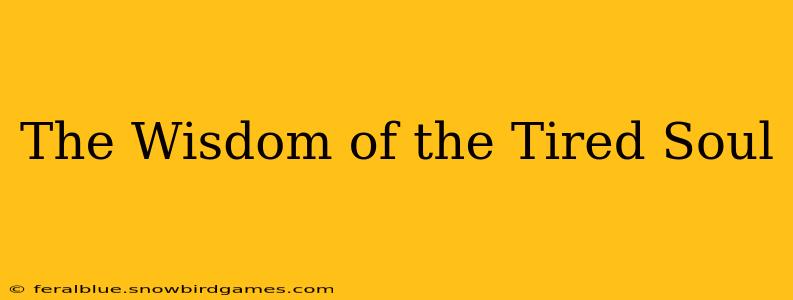We live in a culture that glorifies the hustle. The relentless pursuit of more – more achievements, more possessions, more experiences – leaves many of us feeling perpetually exhausted. But this tiredness, this deep-seated weariness, isn't just a sign of weakness; it can be a profound source of wisdom. It's in the quiet moments of exhaustion that we often find the clarity to re-evaluate our lives and discover what truly matters. This article explores the unexpected wisdom that can emerge from a tired soul, offering insights into finding peace and purpose amidst the relentless demands of modern life.
What Does a Tired Soul Feel Like?
Before delving into the wisdom itself, it's important to understand what a "tired soul" actually feels like. It's more than just physical fatigue. It's a deep-seated weariness that permeates every aspect of your being. It's a feeling of being emotionally drained, mentally depleted, and spiritually empty. This weariness might manifest as:
- Constant fatigue: Even after a full night's sleep, you wake up feeling drained.
- Emotional numbness: You find it difficult to experience joy, excitement, or even sadness.
- Lack of motivation: Simple tasks feel overwhelming, and you struggle to find the energy to pursue your goals.
- Feeling overwhelmed: You're constantly battling a sense of being overloaded and incapable of coping.
- Loss of connection: You feel disconnected from yourself, your loved ones, and the world around you.
This isn't simply burnout; it's a deeper exhaustion, a soul-deep weariness that suggests a need for significant life adjustments.
How Can Exhaustion Lead to Wisdom?
The relentless pace of modern life often prevents us from slowing down and reflecting on our lives. Exhaustion, however, forces us to do just that. The sheer inability to continue pushing forward compels introspection. In this stillness, we gain access to a wellspring of wisdom:
- Identifying priorities: When we're exhausted, we're forced to prioritize. We can no longer juggle everything; we must choose what truly matters. This process can lead to a clearer understanding of our values and goals.
- Letting go of the non-essential: Exhaustion highlights what drains us. It forces us to recognize activities, relationships, or beliefs that no longer serve us, allowing us to shed these burdens and create space for what truly nourishes our souls.
- Developing self-compassion: Exhaustion can foster self-compassion. We realize that we are not machines and that it's okay to slow down, to rest, and to prioritize our well-being.
- Appreciating the simple things: When we're overwhelmed, the small joys of life often go unnoticed. Exhaustion can help us rediscover the beauty in simplicity – a warm cup of tea, a quiet moment alone, the connection with nature.
- Seeking support: Recognizing our exhaustion can lead us to seek help from loved ones, therapists, or other support systems. This can be crucial in navigating challenging times and finding paths to healing.
What are the Signs of a Tired Soul? (Addressing a potential PAA)
The signs of a tired soul are often subtle at first. They might include a persistent feeling of emptiness, a lack of joy in activities you once enjoyed, difficulty concentrating, increased irritability, and physical symptoms like headaches or digestive problems. These aren't necessarily indications of a serious medical condition but rather signals that your soul needs replenishment.
How Can I Heal My Tired Soul? (Addressing a potential PAA)
Healing a tired soul requires a multifaceted approach. It's not a quick fix but a journey of self-discovery and self-care. Key steps include:
- Prioritizing rest and relaxation: This includes getting enough sleep, incorporating regular breaks into your day, and engaging in activities that help you unwind and de-stress.
- Setting healthy boundaries: Learning to say "no" to commitments that drain your energy is crucial for protecting your well-being.
- Connecting with nature: Spending time outdoors can be incredibly restorative. Engage in activities like hiking, gardening, or simply sitting under a tree.
- Practicing mindfulness and meditation: These practices help to quiet the mind, reduce stress, and foster a sense of inner peace.
- Seeking professional help: If you're struggling to cope with exhaustion, don't hesitate to reach out to a therapist or counselor.
Is Exhaustion Always a Bad Thing? (Addressing a potential PAA)
While exhaustion is certainly unpleasant, it's not inherently "bad." In fact, it can serve as a powerful catalyst for positive change. It can be a wake-up call, forcing us to confront our unsustainable lifestyles and make necessary adjustments. The key is to listen to the message your body and soul are sending and take steps to address the underlying causes of your exhaustion.
The wisdom of the tired soul lies in its capacity to lead us towards greater self-awareness, healthier boundaries, and a more meaningful life. It is a challenging, but ultimately transformative, experience. By embracing the lessons learned in the stillness of exhaustion, we can emerge stronger, wiser, and more deeply connected to ourselves and the world around us.

